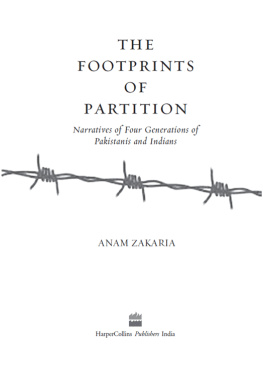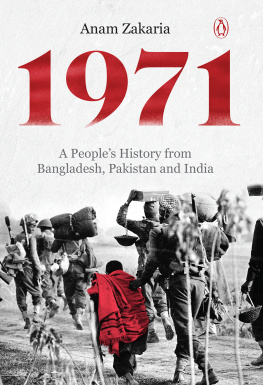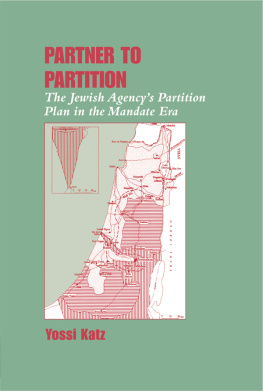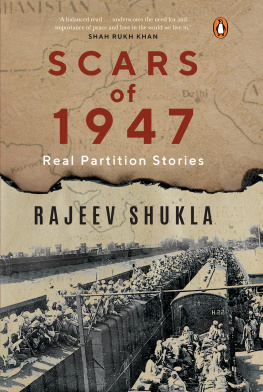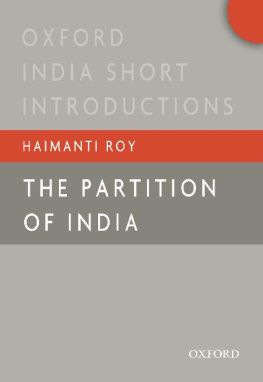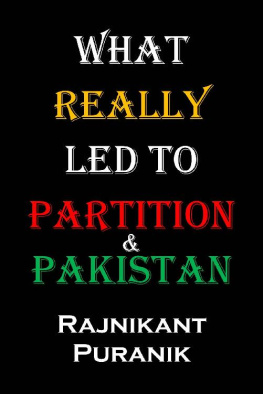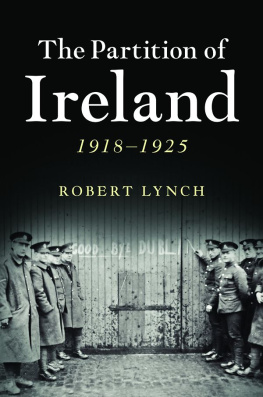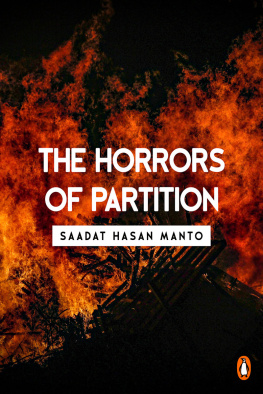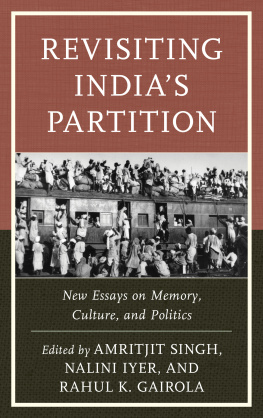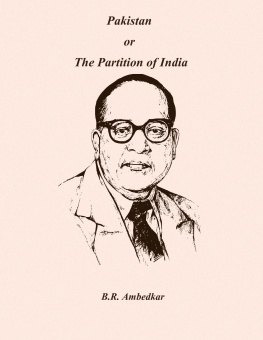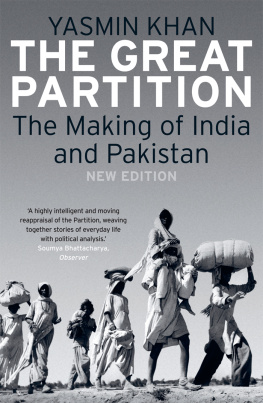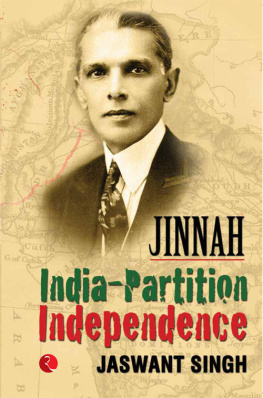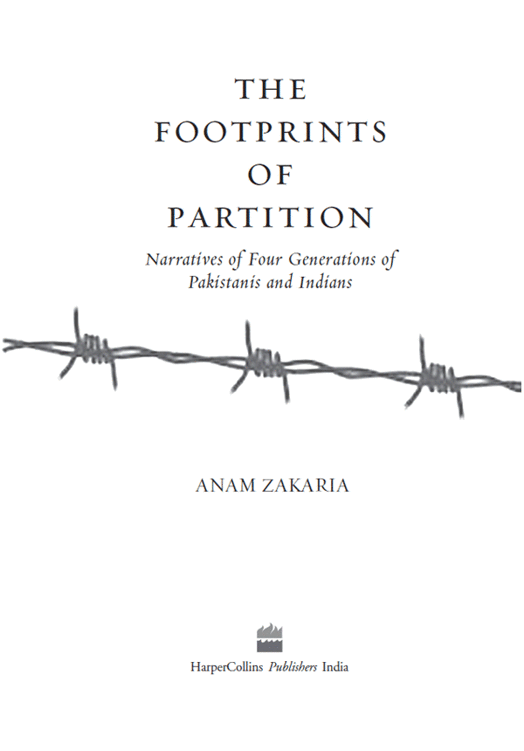
ADVANCE PRAISE FOR THE BOOK
Told with compassion, curiosity and sometimes gentle humour, these Partition accounts give life to the dry documents of history; they remind us of how much there is to be learned from the lived experiences of those caught in its sweep.Urvashi Butalia, author of
The Other Side of Silence:Voices from the Partition of India, and
Partition: The Long ShadowDrawing upon rich layers of oral histories, archives and fast fading voices, Anam Zakaria paints a rather unforgettable image of what the earlier generations underwent, and in some cases continue to do. It is now for the third-generation Pakistanis and Indians to undo the toxic past and ensure that it doesnt repeat itself. This is why
The Footprints of Partition is such an essential book of the future.Raza Rumi, journalist and author of
Delhi by HeartA moving, inspiring and thoughtful first-person account of a young womans process of unlearning about the enemy and learning to embrace and accept the other as fellow human beings. The process involves a rich and varied series of experiences that Anam Zakaria shares openly with readers, lightly interspersed with historical context and her own insightful analyses.Beena Sarwar, writer and documentary filmmakerAnams effort in writing this book has been painstaking, sensitive, realistic, constructive and necessary. She has performed a distinct service.Rajmohan Gandhi, biographer and journalistAnam Zakaria probes residue of the horrific events of 47, through sensitively conducted conversations. She sifts through memories, long supressed or glossed over. These vastly varied chronicles are compelling, each in its own way. They help to piece togther a peoples history, often at odds with the grand narratives of the state.Salima Hashmi, writer and artistAnam Zakarias book on Partition brings a kind of freshness and
insaniyat to our understanding of the event. It is about young people in Pakistan trying to break free from inherited prejudices, and longing to find, like many in India and elsewhere, secular spaces of justice and peace in the near future. We need, urgently, a new politics of hope.Dr Alok Bhalla, author of
Stories about the Partition of India and
Partition DialoguesTo Muhammad Rauf and the countless other Indians and Pakistanis who have died with the aching desire to cross the border and reconnect with the homes and lives they left behind in 1947
CONTENTS
PART I: THE BORDER: Azad Qaidis
| 1. | Blurred Lines
Naseer Ashiq |
| 2. | The Bus That Did Not Stop
Muhammad Rauf |
PART II: FAMILIES PARTITIONED: When Home Is Elsewhere
| 3. | Tea at No-Mans-Land
Tina Vachani |
| 4. | Uneasy Come, Uneasy Go
Shireen and Amy |
| 5. | Sustaining Old Bonds
Malik Siddiqui |
PART III: RECLAIMING HERITAGE: AMuseum of Memories
| 6. | Letting Go
Roshan Ara |
| 7. | At Home in Enemy Country
Mr and Mrs Intikhab Alam |
| 8. | A Daughter Fulfils Her Mothers Dying Wish
Ambreen Raja |
| 9. | The Train at Pul Bangash
Rana Kamal Ud-Din and Owais Rana |
| 10. | A Punjabi without Roots
Alpana Kishore |
| 11. | Hitlers Dog
Rafay Alam |
| 12. | Closing a Chapter, Starting Another
Shiraz |
PART IV: REDEFINING PARTITION: Bharat Se Rishta Kya?
| 13. | A Delhi That Was Only Theirs
Mansoor Ahmad |
| 14. | Children of Animosity
Adan Ali |
So many people have been a part of this journey, so many have been responsible for making this happen. However, perhaps the most important are those whose stories I explored during my research. For, without them, there would be no book. I would like to express my gratitude to each person who has allowed me to record his or her story; I realize how painful it has been for some of them to go down memory lane with me. As a writer, the most difficult job has been to do justice to their stories. To bring to light the emotions, the experiences that have shaped their lives. I do know that every word they have shared has become an integral part of me. I am no longer the person I was before I travelled with them through their past and present.
And now to the people who may not have necessarily made it to the pages of this book but are fundamental to its birth: Abu, I write because you write, not as well nor as profusely but I think I love it as much as you do. I also read because you read; because you pushed me to pick up books instead of the TV remote throughout my childhood. Today, these are two of my greatest passions and I am incomplete without them, as I am incomplete without you. Ami, I have thought the hardest of how to thank you and I still dont know how. I dont remember a moment in my life when you havent been there for me, with your unwavering belief and confidence. You are my rock. Haroon, thank you for reading each word, for always pushing me to go the extra mile and standing by me as I attempt to leap forward; I couldnt have done it without you. Nano, your vivid imagination and your extraordinary storytelling skills have been instrumental in opening me up to a world of writing. Nana, my anchor, my mentor, my confidantI miss you so much. Chintan Girish Modi: thank you for inspiring me to write this book. Sharmeen Obaid-Chinoy and Swaleha Alam Shahzada: for all the encouragement and facilitation, every step of the way. My sisters Lyla, Mehreen, Jasmyn, Amal and Natasha: for always standing by me. My friends and colleaguesIqbal Qaiser, Owais Rana, Asma Asif, Hina Mansoor, Mariam Javed, Abrar Ali, Alizeh Khalid, Asiya Shoaib, Ammar Khalid, Kavita Anand and Manjri Sewak: for the enormous support during the writing process. My agent Kanishka Gupta and Writers Side Agency, for representing me and linking me to one of the best publishers in India; you have the power to make dreams come true. My publisher Karthika V.K. and editor Amit Agarwal, thank you for believing in this book and for your confidence in a first-time author. Amit, I have realized how crucial an editor is to the writing process and I thank you wholeheartedly for making this book readable.
Finally, I would like to acknowledge the Citizens Archive of Pakistan (CAP) for allowing me to use experiences from two CAP-sponsored trips to India in 2012 and for using its Oral History Project archive to supplement research. Of course, I alone am responsible, and not CAP, for the way the research has been interpreted or presented in this book.
I remember sitting squeezed at the back of a small silver Cuore, on the way back to Lahore from Sahiwal, when the idea of writing this book struck me. I turned towards my then fianc, Haroon, and told him I had heard the most beautiful story the afternoon before; it was one that had to be documented. The story was of a Pakistani man in his seventies, desperately longing to go visit his home in Amritsar that he had left behind as a child at Partition. He told me that once he had come close to visiting when he was travelling to Qadian for a religious procession alongside other members of the Ahmadiyya community. He had stood at the Wagah border and then passed through Amritsar in a bus, trying to soak in as much as he could. But he couldnt get off; he couldnt visit his home despite being so near. Pakistan and India only issue city visas; his was limited to Qadian and his home wasnt in the allowed perimeters. He had cried while narrating the incident, and in a choked voice he told me it was his dying wish to be able to see his neighbourhood one last time. It remained just a wish, for he passed away a few months later.

